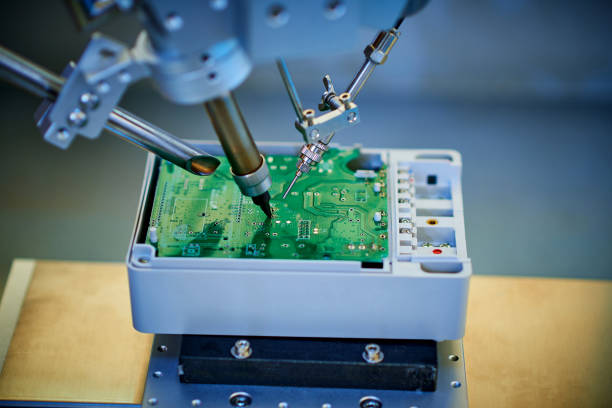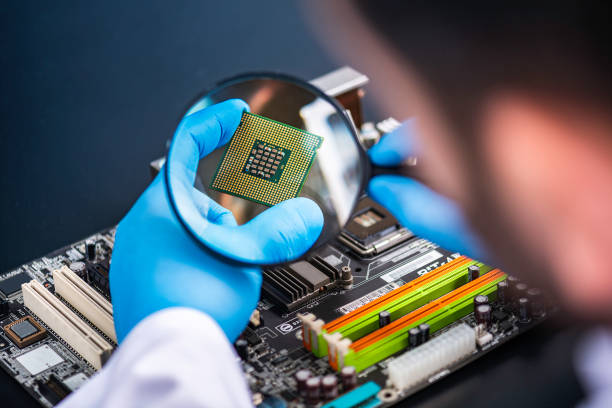How to make a career as Hardware Developer

Hardware development is the process of designing and creating electronic components, devices, and systems. This includes everything from circuit board design to the assembly of computer systems and can involve a wide range of technologies, such as microprocessors, memory chips, sensors, and displays.
The process of hardware development typically involves several stages, including research and planning, design and prototyping, testing and verification, and manufacturing and production. Hardware developers must have a strong understanding of the principles of electrical and computer engineering, as well as knowledge of industry standards and regulations.
Hardware development is an important field that plays a crucial role in driving technological innovation and progress. It enables the creation of new devices and systems that improve our lives and enhances our ability to work, communicate, and connect with others.
What is a role of a Hardware developer?
A hardware developer is someone who designs, tests and develops computer hardware components, such as processors, memory chips, graphics cards, and other electronic devices. Their work involves researching and evaluating new technologies, designing and building prototypes, testing and troubleshooting hardware designs, and collaborating with software developers to ensure hardware and software compatibility.
Hardware developers typically have a background in electrical or computer engineering, and may work in industries such as computer hardware manufacturing, telecommunications, or consumer electronics. They must have a strong understanding of circuit design, digital signal processing, and computer architecture, as well as knowledge of industry standards and regulations. Hardware developers are responsible for creating innovative and reliable hardware solutions that meet the needs of the market and drive technological advancement.
Why there is a huge demand for Hardware developers?
There are several reasons why there is a huge demand for hardware developers:
Advancements in Technology: With the rapid advancements in technology, there is a growing demand for hardware developers who can design, develop, and maintain complex hardware systems. This includes everything from consumer electronics and wearable devices to autonomous vehicles and smart cities.
Internet of Things (IoT): The growth of the Internet of Things (IoT) has created a massive demand for hardware developers. IoT devices require specialized hardware components and software to function properly, and hardware developers are responsible for designing and developing these systems.
Artificial Intelligence (AI) and Machine Learning (ML): AI and ML are transforming industries across the board, and hardware developers are needed to design and develop the hardware components that enable these technologies to function. This includes specialized hardware such as graphics processing units (GPUs) and field-programmable gate arrays (FPGAs) that are optimized for AI and ML workloads.
Cybersecurity: As the world becomes increasingly digital, cybersecurity has become a major concern for businesses and governments alike. Hardware developers are needed to design and develop secure hardware components that protect against cyber attacks and ensure the safety and privacy of users.
Demand for Innovation: There is a constant demand for innovation in the tech industry, and hardware developers play a critical role in driving this innovation forward. From creating new types of hardware systems to optimizing existing ones, hardware developers are at the forefront of technological progress.

What are the competencies of a Hardware Developer?
Hardware developer typically includes a combination of technical, analytical, and creative skills. Here are some common competencies that are expected from a hardware developer:
Technical skills: Hardware developers should have a strong understanding of electrical engineering principles, computer architecture, digital signal processing, and circuit design. They should also have experience with hardware design tools and programming languages such as Verilog, VHDL, and C.
Analytical skills: Hardware developers must be able to analyze and interpret technical data, troubleshoot problems, and identify opportunities for improvement. They should have strong attention to detail and the ability to think critically and creatively.
Project management skills: Hardware development often involves managing complex projects with multiple stakeholders, deadlines, and budgets. Hardware developers must be able to manage timelines, resources, and budgets effectively, and communicate progress and status updates to key stakeholders.
Communication skills: Hardware developers must be able to communicate effectively with other engineers, product managers, and stakeholders to understand requirements, explain technical concepts, and discuss project goals and objectives.
Innovation and creativity: Hardware development requires innovation and creativity to develop new products and technologies that meet the needs of the market. Hardware developers should be able to think outside the box, propose new ideas, and challenge existing assumptions to drive innovation.
What is the technical stack of a Hardware Developer?
The technical stack of a hardware developer refers to the tools, technologies, and languages they use to design, develop, and test hardware systems and components. Here are some common components of a hardware developer’s technical stack:
Design tools: Hardware developers use a variety of design tools such as Computer-Aided Design (CAD) software to design and simulate electronic circuits, Printed Circuit Board (PCB) design software to layout and design circuit boards, and FPGA development tools to create custom logic circuits.
Programming languages: Hardware developers use hardware description languages (HDLs) such as Verilog, VHDL, and SystemVerilog to describe and simulate digital circuits. They may also use lower-level languages such as Assembly and C to program microcontrollers and other embedded systems.
Test and measurement equipment: Hardware developers use a variety of test and measurement equipment such as oscilloscopes, logic analyzers, and signal generators to debug and test their hardware designs.
Manufacturing tools: Hardware developers use tools such as pick and place machines, reflow ovens, and wave soldering machines to assemble and manufacture their hardware designs.
The technical stack of a hardware developer is different from that of a software developer because hardware development involves designing and building physical systems, whereas software development involves creating digital programs and applications. While software developers may use programming languages, integrated development environments (IDEs), and software testing tools, hardware developers rely on a different set of tools and equipment to design, simulate, and test hardware systems. Additionally, the design cycle of a hardware project may take longer than that of a software project, and the cost of manufacturing and assembling hardware can be higher than the cost of distributing software.

How is it different than a regular Software Developer?
A hardware engineer and a software development engineer (SDE) are different in terms of their areas of expertise, their job responsibilities, and the technologies they work with.
Hardware engineers typically specialize in designing and developing electronic hardware systems and components, such as circuit boards, processors, and memory chips. They work with a variety of tools and technologies to design, test, and manufacture hardware systems that meet specific performance requirements. They must have a strong understanding of electrical engineering principles, computer architecture, and digital signal processing, as well as experience with design tools and programming languages such as Verilog, VHDL, and C.
SDEs, on the other hand, specialize in developing software systems and applications. They work with a variety of programming languages, software development tools, and frameworks to design, develop, and test software products that meet specific customer requirements. They must have a strong understanding of software engineering principles, computer science concepts, and programming languages such as Java, Python, and C++.
While both hardware engineers and SDEs may work on projects that involve developing electronic devices or systems, their areas of focus and expertise are different. Hardware engineers typically focus on the design and development of hardware systems, while SDEs focus on the design and development of software applications. Additionally, the design cycle for hardware projects may be longer and more complex than that for software projects, and hardware development may involve more physical prototyping and testing.
How can someone become a hardware developer?
To become a hardware developer, you typically need a combination of education, practical experience, and relevant skills. Here are some steps you can take to become a hardware developer:
Pursue a degree in electrical engineering, computer engineering, or a related field: A bachelor’s degree in electrical engineering or computer engineering is typically required for entry-level hardware developer roles. These programs will provide you with a solid foundation in electronics, digital circuit design, microprocessors, and other related topics.
Gain practical experience through internships or entry-level positions: To gain practical experience, you can look for internships or entry-level positions in hardware development or related fields. This will help you learn about the design, testing, and manufacturing of electronic hardware systems and components.
Learn hardware design tools and languages: Hardware developers use a variety of design tools and programming languages such as Verilog, VHDL, and SystemVerilog. You can take online courses, attend workshops, or read books to learn about these tools and languages.
Practice and build your own projects: To gain more experience and demonstrate your skills, you can work on personal projects such as designing and building your own circuit board or microcontroller system.
Stay up-to-date with the latest technologies and trends: Hardware development is a constantly evolving field, so it’s important to stay up-to-date with the latest technologies and trends by reading industry publications, attending conferences, and networking with other hardware developers.
Consider obtaining professional certifications: Professional certifications such as the Certified Hardware Security Professional (CHSP) or the Certified Hardware Verification Engineer (CHVE) can help demonstrate your expertise and advance your career as a hardware developer.
Becoming a hardware developer requires a combination of education, practical experience, and relevant skills. By following these steps, you can start your journey toward becoming a successful hardware developer.
Who is hiring for a hardware developer?
There are several product companies that hire hardware developers for various positions. Here are some examples of product companies that frequently hire hardware developers:
Apple: Apple is a technology giant that designs, develops, and sells a range of hardware products such as iPhones, iPads, and Mac computers. They hire hardware developers for positions such as hardware engineer, hardware design engineer, and hardware systems engineer.
Intel: Intel is a leading manufacturer of microprocessors and other electronic components. They hire hardware developers for positions such as hardware design engineer, board design engineer, and system validation engineer.
Amazon: Amazon is a multinational technology company that designs and develops a range of hardware products such as Kindle e-readers, Fire tablets, and Echo smart speakers. They hire hardware developers for positions such as hardware development engineer, electrical engineer, and firmware engineer.
NVIDIA: NVIDIA is a technology company that specializes in graphics processing units (GPUs) and artificial intelligence (AI) technology. They hire hardware developers for positions such as hardware engineer, system validation engineer, and ASIC design engineer.
Microsoft: Microsoft is a technology company that develops software, hardware, and other related products. They hire hardware developers for positions such as hardware design engineer, electrical engineer, and firmware engineer.
The companies that are known to hire hardware engineers from the semiconductor industry:
Intel Corporation
Qualcomm Technologies, Inc.
NVIDIA Corporation
Advanced Micro Devices, Inc. (AMD)
Texas Instruments
Broadcom Inc.
Analog Devices, Inc.
Micron Technology, Inc.
Applied Materials, Inc.
Infineon Technologies AG
Top semiconductor companies in the US, based on their revenue and market capitalization:
Intel Corporation
Qualcomm Incorporated
NVIDIA Corporation
Broadcom Inc.
Texas Instruments Incorporated
Micron Technology, Inc.
Applied Materials, Inc.
Analog Devices, Inc.
Advanced Micro Devices, Inc. (AMD)
Lam Research Corporation
Top semiconductor companies in Asia, based on their revenue and market capitalization:
TSMC (Taiwan Semiconductor Manufacturing Company)
Samsung Electronics
SK hynix Inc.
Sony Corporation
Toshiba Corporation
Renesas Electronics Corporation
MediaTek Inc.
United Microelectronics Corporation (UMC)
Semiconductor Manufacturing International Corporation (SMIC)
Rohm Co. Ltd.
There are several companies in India that hire hardware developers for various positions. Here are some examples of companies that frequently hire hardware developers in India:
- Intel India: Intel India is a subsidiary of Intel Corporation and is involved in the design and development of microprocessors and other electronic components. They hire hardware developers for positions such as hardware design engineer, board design engineer, and system validation engineer.
- Qualcomm India: Qualcomm is a multinational semiconductor and telecommunications equipment company that designs and develops wireless communication products. They hire hardware developers for positions such as hardware design engineer, RF hardware engineer, and system validation engineer.
- NVIDIA India: NVIDIA is a technology company that specializes in graphics processing units (GPUs) and artificial intelligence (AI) technology. They hire hardware developers for positions such as hardware engineer, system validation engineer, and ASIC design engineer.
- Wipro: Wipro is an Indian multinational corporation that provides information technology, consulting, and business process services. They hire hardware developers for positions such as hardware engineer, embedded systems engineer, and PCB design engineer.
- Samsung Electronics India: Samsung Electronics is a multinational electronics company that designs and develops a range of products such as smartphones, tablets, and televisions. They hire hardware developers for positions such as hardware design engineer, system validation engineer, and firmware engineer.
Platforms and websites where hardware developers can socialize, collaborate, and share knowledge. Here are some of the most popular ones:
Hackster.io: Hackster.io is a community of hardware developers, makers, and enthusiasts. The platform allows users to share their projects, tutorials, and ideas, and to connect with other members of the community.
GitHub: GitHub is a popular platform for software development, but it’s also a great place for hardware developers to collaborate on hardware projects. GitHub allows users to share code, designs, and other project assets, and to track changes and collaborate with others.
Element14: Element14 is an online community for engineers and makers. The platform offers forums, blogs, and resources on a wide range of hardware topics, including electronics, robotics, and IoT.
Arduino Forum: The Arduino Forum is a popular online community for Arduino enthusiasts and developers. The forum offers support, tutorials, and project ideas, and allows users to connect with other Arduino developers from around the world.
Adafruit: Adafruit is a popular online store for electronics and hardware components, but it also offers a community section where users can share projects, tutorials, and ideas. The platform includes forums, blogs, and live chat sessions with Adafruit staff and other members of the community.
Reddit: There are several subreddits dedicated to hardware development and related topics, including r/AskElectronics, r/PrintedCircuitBoard, and r/embedded. These subreddits offer a wealth of information and resources, as well as a place to connect with other developers and enthusiasts.
Book recommendations for beginners and advanced readers in hardware development:
For beginners:
“Getting Started with Arduino” by Massimo Banzi – This book is a great introduction to hardware development using Arduino boards. It covers the basics of programming, electronics, and building simple projects.
“Make: Electronics” by Charles Platt – This book is a comprehensive guide to electronics for beginners. It covers basic electronics concepts, components, and circuits, and includes hands-on projects to help readers build their skills.
“The Art of Electronics” by Paul Horowitz and Winfield Hill – This book is a classic text on electronics that covers both theory and practical applications. It’s a great resource for beginners who want to gain a deeper understanding of electronics.
For advanced readers:
“Digital Design and Computer Architecture” by David Harris and Sarah Harris – This book is a comprehensive guide to digital design and computer architecture. It covers topics such as logic design, computer arithmetic, and memory systems, and includes hands-on projects using FPGAs.
“Embedded Systems: Introduction to Arm Cortex-M Microcontrollers” by Jonathan Valvano – This book is a thorough introduction to embedded systems and microcontroller programming using Arm Cortex-M processors. It covers topics such as real-time operating systems, interrupts, and peripheral interfacing.
“High-Speed Digital Design: A Handbook of Black Magic” by Howard Johnson and Martin Graham – This book is a practical guide to high-speed digital design. It covers topics such as signal integrity, noise reduction, and power distribution, and includes real-world examples and case studies.
“Analog Circuit Design: Art, Science, and Personalities” edited by Jim Williams – This book is a collection of articles by analog circuit design experts, covering topics such as op amps, filters, and data converters. It offers a wealth of practical advice and insights into the field of analog circuit design.
Job boards
IEEE JobSite: IEEE JobSite is a job board specifically for engineering and technology jobs, including hardware development positions. Employers can post job openings, and job seekers can search for opportunities and apply online.
HardwareJobs.com: HardwareJobs.com is a job board that specializes in hardware-related positions, including hardware engineering, embedded systems, and semiconductor design. The platform offers job search tools, resume services, and job alerts.
Dice.com: Dice.com is a job board for technology professionals, including hardware developers. Employers can post job openings, and job seekers can search for opportunities and create a profile to receive job alerts.
Indeed.com: Indeed.com is a general job board that includes a wide range of job categories, including hardware development. Employers can post job openings, and job seekers can search for opportunities and create job alerts.
Glassdoor.com: Glassdoor.com is a job board that includes company reviews and salary data, as well as job postings. Employers can post job openings, and job seekers can search for opportunities and access company reviews and salary information.
LinkedIn Jobs: LinkedIn Jobs is a job board that allows employers to post job openings and job seekers to search for opportunities based on their skills and experience. LinkedIn also offers networking opportunities and tools for building a professional profile.
Hope this information will help you to follow your dreams to be a Hardware Developer.





